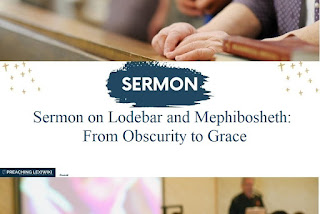Lodebar: From Obscurity to Grace
We embark on a journey into the heart of God's transformative grace as we explore the story of Mephibosheth and the town of Lodebar. In 2 Samuel 9, we witness a powerful narrative of obscurity turning into a profound encounter with grace. As we delve into the chapters of this story, may our hearts be stirred by the redemptive power of God's grace and the transformative effect it can have on the lives of those dwelling in obscurity.
-- Ads --
I. The Origin of the Name Lodebar: 2 Samuel 9:4
The very name "Lodebar" carries the weight of obscurity and lack. In 2 Samuel 9:4, we explore the origin of this name and the symbolism it holds for the lives of many who find themselves dwelling in the shadows, far from the King's presence.
Lo-debar means, “no pature, place of desolation, barrenness.” Lo Debar was an actual place in ancient Israel and it meant “place of no pasture”, “place of nocommunication”, and “place of nothing”. People would be sent to that obscure place because of thecircumstances of their life that treated them unfairly.
We read in 2 Samuel 4:4 about the start of story of Mephibosheth – someone who was supposedto be the heir to a throne, but sees himself disabled, orphaned and exiled in Lo Debar because ofcircumstances that he didn’t deserve.
II. Mephibosheth, Son of Jonathan: 2 Samuel 9:6-7
Mephibosheth, the son of Jonathan, is introduced to us in 2 Samuel 9:6-7. His lineage ties him to the house of Saul, and we witness how his connection to royalty becomes a pivotal factor in the unfolding narrative of grace.
III. Mephibosheth's Lameness Status: 2 Samuel 9:13
Lameness, a condition often associated with weakness, becomes a significant aspect of Mephibosheth's story in 2 Samuel 9:13. His physical state mirrors the brokenness that often accompanies obscurity, setting the stage for the transformative grace that is about to unfold.
IV. The Invitation to the King's Table: 2 Samuel 9:7
In 2 Samuel 9:7, we witness the unexpected invitation extended by King David to Mephibosheth. This invitation, bestowed upon one from the obscure town of Lodebar, reflects God's grace reaching out to us in the midst of our brokenness and insignificance.
-- Ads --
V. The Grace Shown by David: 2 Samuel 9:8
David's grace toward Mephibosheth in 2 Samuel 9:8 is a powerful reflection of God's unmerited favor. It exemplifies how God's grace doesn't consider our past or our limitations but embraces us with open arms, inviting us into His presence.
VI. The Restoration of Saul's Inheritance: 2 Samuel 9:9-10
In 2 Samuel 9:9-10, David goes beyond mere kindness; he restores to Mephibosheth the inheritance that belonged to Saul. This act signifies God's desire not only to bless us with grace but to restore what was lost and broken in our lives.
VII. The Return of Dignity to Mephibosheth: 2 Samuel 9:11
Dignity, lost in the obscurity of Lodebar, is beautifully restored to Mephibosheth in 2 Samuel 9:11. As we explore this moment, may we be reminded that God's grace not only forgives but elevates us, granting us a place of honor and dignity in His presence.
VIII. Lodebar Transformed by Grace: 2 Samuel 9:13
The transformation of Lodebar itself is a profound aspect of this story (2 Samuel 9:13). As grace permeates the obscure town, we witness the redemptive power of God's love, turning desolation into a place of abundance and blessing.
IX. The Example of Mephibosheth as a Receiver of Grace: 2 Samuel 9:13
In 2 Samuel 9:13, Mephibosheth stands as an example of one who receives grace with humility and gratitude. His journey from obscurity to the King's table becomes a beacon of hope for all who find themselves in the shadows.
- Sermon on Joseph: Lessons from His Life
- Sermon on New Year: 7 Goals for Christians
- Sermon on 4th of July: Celebrating True Freedom
Conclusion:
The story of Mephibosheth and Lodebar is not merely a historical account but a living testimony of God's grace reaching into the depths of our obscurity. As we reflect on these chapters, may our hearts be stirred to embrace the transformative grace of our Heavenly King, who invites us from our places of brokenness to His table of abundance. May we, like Mephibosheth, become recipients and ambassadors of this divine grace, bringing hope to the obscure places of this world.

